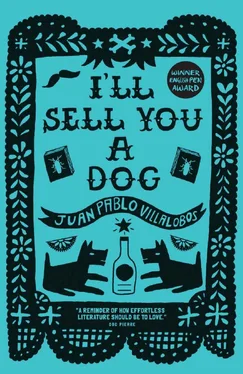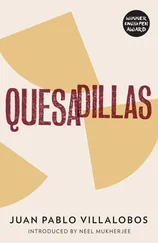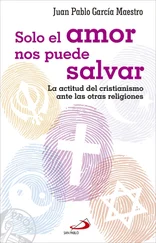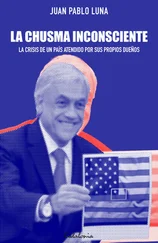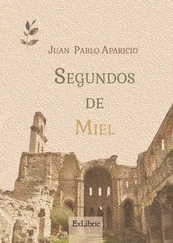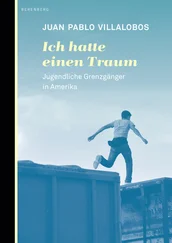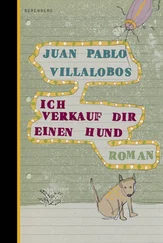‘I don’t even know, they used to call him the Sorcerer. I never asked him his real name and now it’s impossible to find out, he was swallowed up by history. Or oblivion, rather.’
‘Gawd has mercy on the fargotten ones.’
‘Are you going to let me watch the film?’
Later on, after Willem finally left, I rewound the video until I spotted a photograph I’d seen out of the corner of my eye, while Willem prattled away, endeavouring to divert my attention from the screen. It was a portrait of Juan O’Gorman embracing a woman called Nina Masarov. I pressed pause and looked at the photo as I sipped my beer, then another beer, and another. Although it was a wedding photo, a postcard the artist had sent to Frida Kahlo from Europe, it was surely the saddest picture I had ever seen: to the artist’s habitual tormented expression was added the resigned, absent look of the bride, who seemed to be perfectly aware that this union had no future. Or worse: that nothing had any future. I guessed she must hail from one of the superpowers of sadness: some central European country, or Germany, Poland, Mother Russia. I looked at the portrait and thought about Marilín, and about all the women who could have been mine and who never, ever were. O’Gorman was right: sometimes life was so sad you had to kill yourself three times. I’d had too much to drink. I opened my notebook and started writing down everything I remembered about Marilín, the way she growled, the length of her legs, that hair of hers she’d never let me touch, just as she never let me touch any part of her.
That night I had a dream: I was dancing a bolero with Marilín and, just as I was about to speak to her, to say one of those daft things lovers say to each other, I felt two light taps on my back. When I turned around I saw the Sorcerer holding a shoe in his right hand, an enormous great shoe he was holding up high and with which he started striking me in the face. Then everything went dark and I didn’t even feel the blow as my body hit the ground. When I awoke, in the dream, I was looking up at the Sorcerer from below, I was still on the ground but we weren’t in the place where I’d been dancing, we were in a bedroom. The walls of the room were covered in paintings of pigeons, dead pigeons, pigeons tied up, their feathers all plucked, their bodies bloody. There was an unmade bed, the rumpled sheets forming a tangled mass in the middle, and paintbrushes and canvases everywhere. It was the Sorcerer of the early days, with the excessive vitality of those who are unable to control the swings between joy and unhappiness, so different to the demented, emaciated Sorcerer at the end of his days. He came over to me and raised his foot, threatening to step on me, and then opened his mouth and said:
‘What’s going on, compadre? This novel’s starting to sound really cheesy.’
‘This isn’t a novel,’ I objected.
‘Oh really! Well that’s what it looks like.’
‘How did we get here?’
‘What does that matter?’
‘We were at a dance.’
‘We were , now we’re here.’
‘Where’s Marilín?’
‘Marilín, Marilín… I’VE SUFFERED MORE THAN CHRIST! YOU HEAR? I’VE SUFFERED MORE THAN CHRIST! IF YOU THINK I’M GOING TO LET YOU STICK ME IN A ROMANTIC NOVEL OR A SELF-HELP BOOK THEN YOU’RE VERY, VERY WRONG!’
At that moment I woke up, because, as well as the Sorcerer shouting in the dream, outside, in real life, I got a stabbing pain in my liver. It took me so long to get back to sleep that I memorised the whole dream.
In the morning, a tense silence in the lift as it descended. The minute the apparatus juddered to a halt in the lobby, Francesca started correcting me.
‘Marilyn doesn’t have an accent on the last syllable. And you spell it with a “y”.’
An inspector from the Federal District department and the head of the street sellers’ association came to the taco stand. It was six in the evening and my uncle hadn’t arrived yet. I was standing on the corner, waiting for him. The inspector showed me his ID, making it clear that this authorised him to commit superior abuses. The other guy took out a little plastic case containing a filthy card from the National Confederation of Popular Organisations, which apparently was a passport to anywhere he could think of. I had seen this man before: he was the guy we paid our rates to. That’s what my uncle called him: the rates guy. They both carried folders stuffed with papers, pens behind their ears, paper clips stuck in the buttons of their shirts; they were dressed as itinerant jobsworths.
‘You’re the kid who helps old Bigotes out, aren’t you?’ the rates guy said, inserting the card back into its plastic holder as delicately as an antiques dealer.
Bigotes was my uncle’s taco-selling nickname, on account of his large moustache, and also the name of his stand: Tacos Don Bigotes. I said that I was and that he was running late, that by now the stand should have been set up and I should be slicing the onions and the coriander.
‘Didn’t you hear what happened?’ the inspector asked.
I shook my head from right to left and from left to right.
‘Old Bigotes kicked the bucket,’ the rates guy said.
‘What?’ I said, from shock, but they took it to mean that I wanted to know how it had happened.
‘They found him in La Alameda, he’d been stabbed five times, twice fatally,’ the inspector explained.
‘What?’ I said again, from shock once more, and this time they thought I wanted to know why.
‘Seems it was “girl trouble”,’ said the inspector, the tone of bureaucratic sarcasm in his voice adding scare quotes.
‘Gay trouble, more like,’ the rates guy said, laughing.
I raised my eyebrows as close to my hairline as I could: instinct told me it was better to pretend I knew nothing about this.
‘You didn’t know Bigotes was a faggot?’ the inspector said.
I said that I didn’t. What I actually said was: ‘What?’
‘What about you?’ the rates guy asked.
‘What about me?’
‘Are you a faggot too?’
I said I wasn’t, that I had a girlfriend.
‘Well everyone thinks you’re a faggot,’ he went on. ‘All Bigotes’ assistants were. He brought them all from a place on Calle Luis Moya. Do you know what I’m talking about? You’re not lying to us, are you?’
I explained that Bigotes had given me a job because he was my uncle. They looked at each other, as if checking whether it was appropriate to offer condolences in this kind of situation, dealing with this sort of people. They concluded that it wasn’t.
‘But are you a faggot or not?’ the rates guy insisted.
‘No, I’ve told you, Bigotes was my uncle.’
‘Well, let’s just hope it’s not genetic,’ the inspector said.
‘Are you or aren’t you?’ the rates guy asked again.
I said that I wasn’t, again.
‘Good,’ the inspector said. ‘You’ll be of more use to us that way.’
‘Are you interested in business, kid?’ the rates guy asked.
‘Business?’ I said, because I didn’t understand, but they thought I wanted to know how it worked.
‘We’ll let you have this corner and you give us ten per cent of what you make,’ the rates guy said. ‘Ten for me and ten for my associate here.’
‘Ten for the Confederation and ten for the Department,’ the inspector corrected him.
‘But I don’t have a stand,’ I said.
They explained that they’d lease it to me, that it was part of the agreement and was already included in the ten per cent.
‘Twenty per cent,’ the rates guy said.
‘Are you in?’ the inspector asked.
‘I don’t know, I’ll have to talk to my mother.’
Читать дальше
